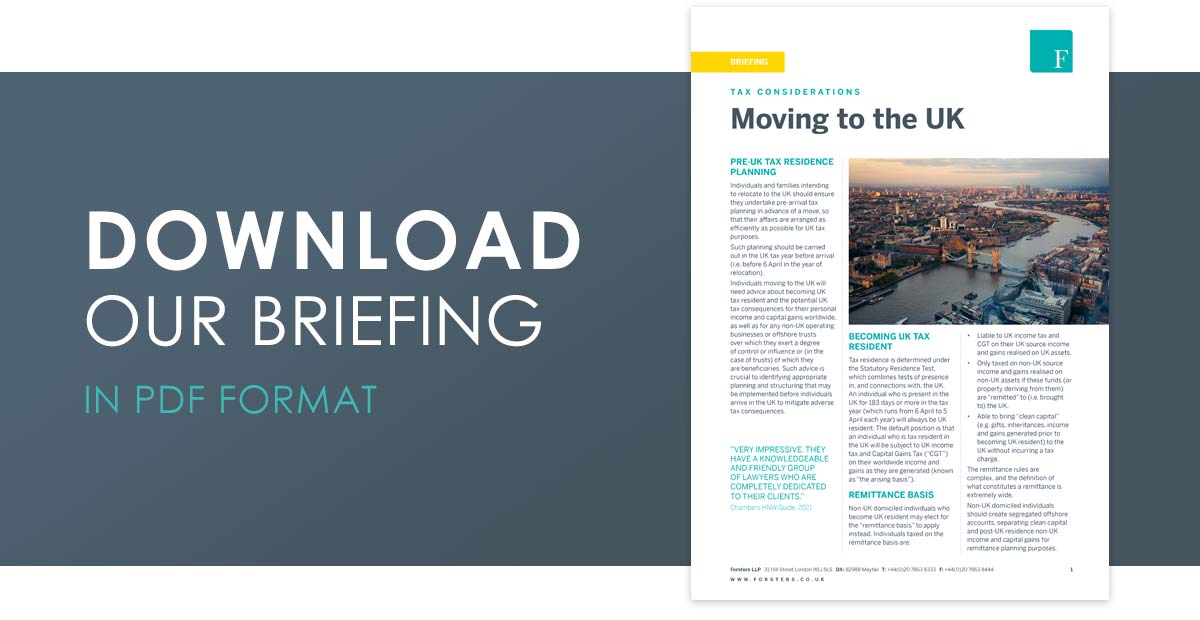Tax Considerations – Moving to the UK

Pre-UK Tax Residence Planning
Individuals and families intending to relocate to the UK should ensure they undertake pre-arrival tax planning in advance of a move, so that their affairs are arranged as efficiently as possible for UK tax purposes.
Such planning should be carried out in the UK tax year before arrival (i.e. before 6 April in the year of relocation).
Individuals moving to the UK will need advice about becoming UK tax resident and the potential UK tax consequences for their personal income and capital gains worldwide, as well as for any non-UK operating businesses or offshore trusts over which they exert a degree of control or influence or (in the case of trusts) of which they are beneficiaries. Such advice is crucial to identifying appropriate planning and structuring that may be implemented before individuals arrive in the UK to mitigate adverse tax consequences.
Becoming UK Tax Resident
Tax residence is determined under the Statutory Residence Test, which combines tests of presence in, and connections with, the UK. An individual who is present in the UK for 183 days or more in the tax year (which runs from 6 April to 5 April each year) will always be UK resident. The default position is that an individual who is tax resident in the UK will be subject to UK income tax and Capital Gains Tax (“CGT”) on their worldwide income and gains as they are generated (known as “the arising basis”).
Remittance Basis
Non-UK domiciled individuals who become UK resident may elect for the “remittance basis” to apply instead. Individuals taxed on the remittance basis are:
- Liable to UK income tax and CGT on their UK source income and gains realised on UK assets
- Only taxed on non-UK source income and gains realised on non-UK assets if these funds (or property deriving from them) are “remitted” to (i.e. brought to) the UK
- Able to bring “clean capital” (e.g. gifts, inheritances, income and gains generated prior to becoming UK resident) to the UK without incurring a tax charge
The remittance rules are complex, and the definition of what constitutes a remittance is extremely wide.
Non-UK domiciled individuals should create segregated offshore accounts, separating clean capital and post-UK residence non-UK income and capital gains for remittance planning purposes.
Remittance Basis Charge (‘RBC’)
Claiming the remittance basis is free for the first seven years of UK residence. Thereafter:
- For individuals who have been resident in the UK in at least 7 of the preceding 9 tax years, there is an annual charge of £30,000 to claim the benefit of the remittance basis
- The RBC increases to £60,000 per year for individuals who have been resident in the UK in 12 of the preceding 14 tax years
Domicile
In the UK, the concept of “domicile” (broadly speaking) denotes the jurisdiction with which an individual is most closely connected and is often said to be the country which they consider to be their permanent home, or where they intend to end their days. Whereas an individual may be tax resident in more than one jurisdiction at any given time, an individual is only capable of having one domicile.
It is likely that an individual moving to the UK for the first time will be non-UK domiciled, and (if that is the case) should remain non-UK domiciled provided they do not form an intention to remain in the UK permanently or indefinitely.
Deemed Domicile
A person who is not otherwise domiciled in the UK will be treated as deemed domiciled in the UK once they have been UK resident for at least 15 of the 20 tax years immediately preceding the relevant tax year. Consequently, a non-UK domiciled individual will become deemed domiciled for all UK tax purposes from the start of their sixteenth year of UK residence, from which time they will no longer be eligible to claim the remittance basis of taxation.
Conclusion
The above guide provides a high-level overview of some of the key UK tax rules that need to be considered in advance of moving to the UK. If only one thing is clear it’s that the UK tax system is complicated and navigating the rules will be unique for each person’s individual circumstances. Therefore, it is vital that individuals looking to move to the UK, obtain advice on the UK tax rules at as early a stage as possible and, where relevant, put in place robust and appropriate pre-arrival structuring and planning.
If you have a questions in relation to any of the matters raised in our briefing, or for further information on the subject, please contact a member of our team.
Non-dom rules to be replaced with four-year temporary residence regime
The Chancellor of the Exchequer, Jeremy Hunt, has announced that the government will abolish the current tax regime for individuals who are UK resident but not UK domiciled in favour of a residency-based system, which will apply from 6 April 2025.
Moving to the UK – Everything you need to know
Moving to the UK is an exciting life event whether it be a short-term move for work to explore business prospects or a more permanent relocation with the whole family; the UK offers an eclectic range of options to live, work and learn, from the cityscapes of London to vineyards in the English countryside and historic university towns in-between. Setting up life in a new country can feel daunting too and it can be difficult to know where to start.
Senior Executives: thinking of relocating to the UK?
We answer common questions raised at key stages of the relocation process.
































